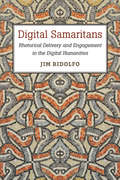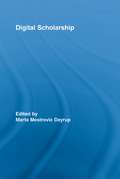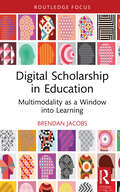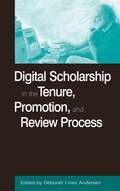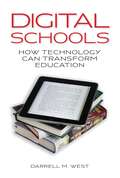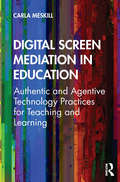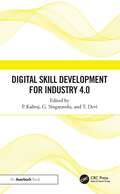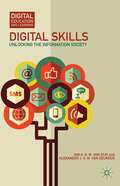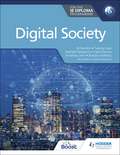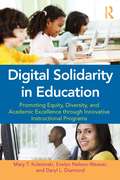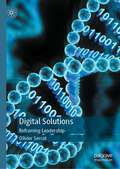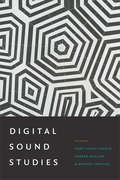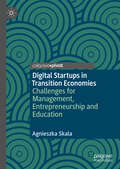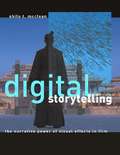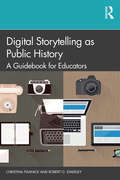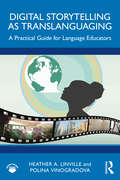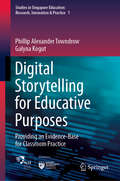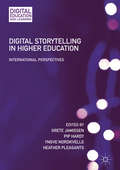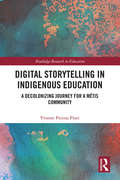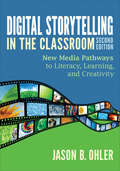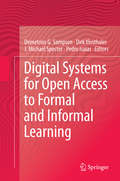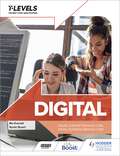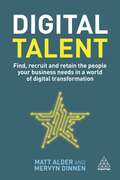- Table View
- List View
Digital Samaritans: Rhetorical Delivery And Engagement In The Digital Humanities
by Jim RidolfoDigital Samaritans explores rhetorical delivery and cultural sovereignty in the digital humanities. The exigence for the book is rooted in a practical digital humanities project based on the digitization of manuscripts in diaspora for the Samaritan community, the smallest religious/ethnic group of 770 Samaritans split between Mount Gerizim in the Palestinian Authority and in Holon, Israel. Based on interviews with members of the Samaritan community and archival research, Digital Samaritans explores what some Samaritans want from their diaspora of manuscripts, and how their rhetorical goals and objectives relate to the contemporary existential and rhetorical situation of the Samaritans as a living, breathing people. How does the circulation of Samaritan manuscripts, especially in digital environments, relate to their rhetorical circumstances and future goals and objectives to communicate their unique cultural history and religious identity to their neighbors and the world? Digital Samaritans takes up these questions and more as it presents a case for collaboration and engaged scholarship situated at the intersection of rhetorical studies and the digital humanities.
Digital Scholarship (Routledge Studies in Library and Information Science)
by Marta Mestrovic DeyrupCollecting important original essays by librarians and archivists – all of whom are actively engaged in building digital collections – Digital Scholarship details both challenges and proven solutions in establishing, maintaining, and servicing digital scholarship in the humanities. This volume further explores the ways in which the humanities have benefited from the ability to digitize text and page images of historic documents, mine large corpuses of texts and other forms of records, and assemble widely dispersed cultural objects into common repositories for comparison and analysis--making new research questions and methods possible for the first time. The ten notable scholars included in Digital Scholarship offer a balanced view of the strengths and weaknesses of various approaches to digitization, reporting both progress and problems, examining new business models, new forms of partnerships, and the new technologies and resources that make many more library and archival services available. Librarians and library staff everywhere will find Digital Scholarship an essential text for the modern library and an illuminating resource for anyone looking to understand the changing face of research in the electronic age.
Digital Scholarship in Education: Multimodality as a Window into Learning
by Brendan JacobsThis book is an essential guide to multimodal theses and dissertations (MTDs) which involve researchers working with digital data such as video. Brendan Jacobs explains how MTDs provide new methodological options which can improve both the visibility and quality of research, and then provides a how-to guide for anyone interested in writing an MTD or engaging with digital scholarship. It helps readers understand how digital scholarship can generate insights into learning and contains links to examples of best practice in digital scholarship. Embracing the new methodological possibilities that a purely digital environment provides, this book sets a much-needed precedent for using multimodal approaches in your own research, from classroom practice right up to PhD level.
Digital Scholarship in the Tenure, Promotion and Review Process (History, Humanities, And New Technology Ser.)
by Deborah Lines AndersenTo receive tenure college and university professors have long been required to write scholarly monographs or articles, engage in serious research, and teach effectively. In recent years, however, the emergence of digital scholarship has revolutionized - and complicated - the picture in unexpected ways as new electronic media have enabled academics to communicate scholarly material in innovative formats such as websites, PowerPoint presentations, CD-ROMs, and virtual reality "tours." Despite this growing output of sophisticated digital scholarship, there has been little attempt to set standards, define basic issues and concepts, or integrate electronic scholarship into the tenure debate. This collection of cutting-edge articles marks the first effort to evaluate the place of digital scholarship in the tenure, promotion, and review process. As a primer aimed at scholars, faculty members, and department chairs in the humanities, social sciences, and other fields, as well as deans, provosts, and university administrators, this collection examines the evolution of nontraditional scholarship, analyzes the various formats, and suggests guidelines for assessment on a scholarly level. It also examines the impact of digital scholarship in the classroom and academy and explores new directions for the future. This book will help shape policy in the murky world of tenure review and could become a central text for scholars and administrators everywhere.
Digital Schools
by Darrell M. WestNearly a century ago, famed educator John Dewey said that "if we teach today's students as we taught yesterday's, we rob them of tomorrow." That wisdom resonates more strongly than ever today, and that maxim underlies this insightful look at the present and future of education in the digital age.As Darrell West makes clear, today's educational institutions must reinvent themselves to engage students successfully and provide them with the skills needed to compete in an increasingly global, technological, and online world. Otherwise the American education system will continue to fall woefully short in its mission to prepare the population to survive and thrive in a rapidly changing world.West examines new models of education made possible by enhanced information technology, new approaches that will make public education in the post-industrial age more relevant, efficient, and ultimately more productive. Innovative pilot programs are popping up all over the nation, experimenting with different forms of organization and delivery systems. Digital Schools surveys this promising new landscape, examining in particular personalized learning; realtime student assessment; ways to enhance teacher evaluation; the untapped potential of distance learning; and the ways in which technology can improve the effectiveness of special education and foreign language instruction. West illustrates the potential contributions of blogs, wikis, social media, and video games and augmented reality in K-12 and higher education.Technology by itself will not remake education. But if today's schools combine increased digitization with needed improvements in organization, operations, and culture, we can overcome current barriers, produce better results, and improve the manner in which schools function. And we can get back to teaching for tomorrow, rather than for yesterday.
Digital Schools
by Darrell M. WestNearly a century ago, famed educator John Dewey said that "if we teach today's students as we taught yesterday's, we rob them of tomorrow." That wisdom resonates more strongly than ever today, and that maxim underlies this insightful look at the present and future of education in the digital age.As Darrell West makes clear, today's educational institutions must reinvent themselves to engage students successfully and provide them with the skills needed to compete in an increasingly global, technological, and online world. Otherwise the American education system will continue to fall woefully short in its mission to prepare the population to survive and thrive in a rapidly changing world.West examines new models of education made possible by enhanced information technology, new approaches that will make public education in the post-industrial age more relevant, efficient, and ultimately more productive. Innovative pilot programs are popping up all over the nation, experimenting with different forms of organization and delivery systems. Digital Schools surveys this promising new landscape, examining in particular personalized learning; realtime student assessment; ways to enhance teacher evaluation; the untapped potential of distance learning; and the ways in which technology can improve the effectiveness of special education and foreign language instruction. West illustrates the potential contributions of blogs, wikis, social media, and video games and augmented reality in K-12 and higher education.Technology by itself will not remake education. But if today's schools combine increased digitization with needed improvements in organization, operations, and culture, we can overcome current barriers, produce better results, and improve the manner in which schools function. And we can get back to teaching for tomorrow, rather than for yesterday.
Digital Screen Mediation in Education: Authentic and Agentive Technology Practices for Teaching and Learning
by Carla MeskillDigital Screen Mediation in Education explores the complex role of visual mediation in today’s digitally enhanced classrooms. While the notion that technology tools have agency—that they act to induce learning—pervades contemporary conversations about pedagogy, this unique volume reframes instructional agency around teachers. The book’s theoretically reinforced and multidisciplinary approach to enhancing effective instruction with screen-based technologies spans aesthetics, technical knowledge, teacher empowerment, social media, and beyond. Researchers in educational technology, instructional design, online learning, and digital pedagogies as well as prospective and practicing educators will find a rigorous treatment of how skilled, thoughtful teaching with, through, and around digital screens can bring about successful learning outcomes.
Digital Skill Development for Industry 4.0
by P. Kaliraj T. Devi G. SingaraveluThe Fourth Industrial Revolution, Industry 4.0, is changing the world, and digital transformation technology tools have impacted every walk of life. The nature of work and careers is changing fast – and in the future, the right skills will be prized over academic qualifications. Students must develop various skills, especially technology skills, to become the workforce of the future; the onus of developing these skills falls on educational institutions. The development of innovation and ideation skills in students is a must for them to productively contribute to a future economy. They should have the capability to translate ideas into solutions, products, and systems that are scalable, practically feasible, and adaptable.To prepare students for this digital world, Digital Skill Development for Industry 4.0 contains chapters on developing: Professional skills, cognitive learning Critical thinking skills among modern learners Motivation and student engagement Invoking interest of students Student engagement in e-learning Contextual learning Experimental learning Multidisciplinary learning The book is written for the academic and administrative community of universities and colleges who intend to equip their modern learners with the skills of Industry 4.0. It is also useful as a reference for undergraduate and postgraduate courses, as well as doctoral programs. The book can also serve as a comprehensive reference guide for researchers in the development of tools incorporating new skills and technologies. Practitioners who are interested in introducing digital skill development for Industry 4.0 and its tools to solve real‑world problems can also use this book.
Digital Skills
by Jan A. G. M. van Dijk Alexander J. A. M. van DeursenThe first book to systematically discuss the skills and literacies needed to use digital media, particularly the Internet, van Dijk and van Deursen's clear and accessible work distinguishes digital skills, analyzes their roles and prevalence, and offers solutions from individual, educational, sociological, and policy perspectives.
Digital Society for the IB Diploma
by Michael Fitzpatrick Eli Bomfim Tammy Earle Carol Hancox Jonathon Levin Barbara StefanicsDeveloped in cooperation with the International Baccalaureate®Ensure full coverage of the new Digital Society course with this accessible coursebook written by an experienced international team of IB educators and examiners, enabling students to build skills and understand the importance and impact of digital systems and technologies in the contemporary world.- Explore digital society through the key concepts, content and contexts of the syllabus with clear, real world, internationally-minded examples for each topic.- Delve into the higher-level extension challenges and interventions in digital society using contemporary,real-world issues that allow students to formulate their own recommendations, with chapter reflections to consolidate learning throughout.- Essential tools for inquiry are integrated throughout the course, with links to ATL, TOK, and extended essay.- Specific chapters and activities are featured for conducting inquiries suitable for SL and HL students, with added extended inquiries for HL students.- Prepare for the inquiry project with step-by-step guidance, advice, practice questions and top tips onhow to maximise potential in the assessment.
Digital Society for the IB Diploma
by Michael Fitzpatrick Eli Bomfim Tammy Earle Carol Hancox Jonathon Levin Barbara StefanicsDeveloped in cooperation with the International Baccalaureate®Ensure full coverage of the new Digital Society course with this accessible coursebook written by an experienced international team of IB educators and examiners, enabling students to build skills and understand the importance and impact of digital systems and technologies in the contemporary world.- Explore digital society through the key concepts, content and contexts of the syllabus with clear, real world, internationally-minded examples for each topic.- Delve into the higher-level extension challenges and interventions in digital society using contemporary,real-world issues that allow students to formulate their own recommendations, with chapter reflections to consolidate learning throughout.- Essential tools for inquiry are integrated throughout the course, with links to ATL, TOK, and extended essay.- Specific chapters and activities are featured for conducting inquiries suitable for SL and HL students, with added extended inquiries for HL students.- Prepare for the inquiry project with step-by-step guidance, advice, practice questions and top tips onhow to maximise potential in the assessment.
Digital Solidarity in Education: Promoting Equity, Diversity, and Academic Excellence through Innovative Instructional Programs
by Daryl Diamond Mary T. Kolesinski Evelyn Nelson-WeaverDigital Solidarity in Education is a book for educators, scholars, and students interested in better understanding both the role technology can play in schools and its potential for strengthening communities, optimizing the effects of globalization, and increasing educational access. The digital solidarity movement prioritizes the engagement and mobilization of students from diverse racial, ethnic, linguistic, and economic backgrounds, and with giftedness and/or disabilities, to utilize and apply technologies. This powerful book introduces innovative technological programs including virtual schools, e-tutoring, and interactive online communities for K-12 students that can: • increase students' knowledge and understanding of advanced concepts while reinforcing their basic skills;• reinforce students' communication in their first language while introducing second and third language possibilities;• nurture students' capabilities to think analytically, while using creative and innovative ideas to think simultaneously “outside of the box.” The experienced author team shows how collaborative partners from the private sector can assist public school systems and educators in creating access for all students to technological innovations, with a goal of increasing individual opportunities for future college and career success. Combining theoretical scholarship and research with the personal perspectives of practitioners in the field, this volume shares with readers both the nuts and bolts of using technology in education, and the importance of doing so.
Digital Solutions: Reframing Leadership
by Olivier SerratThis book acts as a valuable quick-access resource on the challenges and opportunities that the digital age presents to organizational leadership. Balanced, comprehensive, and thought-provoking, the book will be useful to professionals and practitioners. The book broadly follows a macro, meso, and micro approach to argumentation and is best read from beginning to end. The book synopsizes the historical context of technological revolutions and reflects on first-order results from enhanced use of information and communication technology in organizations; considers second-level impacts from information and communication technology on economy, society, work, and the very act of organizing; maps out core concepts of agility and principles that leaders should honor to exploit agility in newfound workforce ecosystems; showcases emerging leadership behaviors and mindsets; and specifies the good practice needed to plan and lead digital strategies. The book invites reference to the author's popular Knowledge Solutions: Tools, Methods, and Approaches to Drive Organizational Performance (2017) and the more recent Leading Solutions: Essays in Business Psychology (2021), which it both rests on and extends.
Digital Sound Studies
by Mary Caton Lingold Darren Mueller Whitney TrettienThe digital turn has created new opportunities for scholars across disciplines to use sound in their scholarship. This volume’s contributors provide a blueprint for making sound central to research, teaching, and dissemination. They show how digital sound studies has the potential to transform silent, text-centric cultures of communication in the humanities into rich, multisensory experiences that are more inclusive of diverse knowledges and abilities. Drawing on multiple disciplines—including rhetoric and composition, performance studies, anthropology, history, and information science—the contributors to Digital Sound Studies bring digital humanities and sound studies into productive conversation while probing the assumptions behind the use of digital tools and technologies in academic life. In so doing, they explore how sonic experience might transform our scholarly networks, writing processes, research methodologies, pedagogies, and knowledges of the archive. As they demonstrate, incorporating sound into scholarship is thus not only feasible but urgently necessary. Contributors. Myron M. Beasley, Regina N. Bradley, Steph Ceraso, Tanya Clement, Rebecca Dowd Geoffroy-Schwinden, W. F. Umi Hsu, Michael J. Kramer, Mary Caton Lingold, Darren Mueller, Richard Cullen Rath, Liana M. Silva, Jonathan Sterne, Jennifer Stoever, Jonathan W. Stone, Joanna Swafford, Aaron Trammell, Whitney Trettien
Digital Startups in Transition Economies: Challenges for Management, Entrepreneurship and Education
by Agnieszka SkalaThis book responds to the growing demand for a scientific approach to the concept of startups, which are a manifestation of the digital revolution and an innovation-driven economy. With a focus on digital enterprises, the author presents empirical research carried out over 4 years in collaboration with the Startup Poland Foundation, and provides a developed universal definition of a startup. This book highlights the necessity of a clear definition, in order for startups to be treated as a permanent economic phenomenon, rather than a temporary whim. Addressing the crucial need for an effective startup management methodology and more education on this form of entrepreneurship, Digital Startups in Transition Economies offers guidance for those researching entrepreneurship and innovation, as well as entrepreneurs, public institutions, startup accelerators and technology transfer centres.
Digital Storytelling
by Shilo T. MccleanComputer-generated effects are often blamed for bad Hollywood movies. Yet when a critic complains that "technology swamps storytelling" (in a review of Van Helsing, calling it "an example of everything that is wrong with Hollywood computer-generated effects movies"), it says more about the weakness of the story than the strength of the technology. In Digital Storytelling, Shilo McClean shows how digital visual effects can be a tool of storytelling in film, adding narrative power as do sound, color, and "experimental" camera angles--other innovative film technologies that were once criticized for being distractions from the story. It is time, she says, to rethink the function of digital visual effects. Effects artists say--contrary to the critics--that effects always derive from story. Digital effects are a part of production, not post-production; they are becoming part of the story development process. Digital Storytelling is grounded in filmmaking, the scriptwriting process in particular. McClean considers crucial questions about digital visual effects-- whether they undermine classical storytelling structure, if they always call attention to themselves, whether their use is limited to certain genres--and looks at contemporary films (including a chapter-long analysis of Steven Spielberg's use of computer-generated effects) and contemporary film theory to find the answers. McClean argues that to consider digital visual effects as simply contributing the "wow" factor underestimates them. They are, she writes, the legitimate inheritors of film storycraft.
Digital Storytelling as Public History: A Guidebook for Educators
by Christina Fisanick Robert O. StakeleyDigital Storytelling as Public History: A Guidebook for Educators provides a practical methodology for teaching public history in the digital age. Drawing on a long-standing collaboration, Fisanick and Stakeley examine how and why educators in all arenas should adopt digital storytelling as a means for encouraging interest in local and regional history. The book shows readers how to implement the strategies necessary to help storytellers in a variety of settings create short films that showcase the collections at local and regional historical societies and museums. It also teaches storytellers higher executive functions, such as independent project management, peer and self-critique, and rhetorical savviness. By guiding storytellers through this process of creating public history digital stories, the book enables them to become connected to communities, improve their understanding of regional history, and expand their knowledge of the preservation of historical artifacts. Supported by online handouts and offering a comprehensive methodology for educators, this is the ideal guide for those teaching public history in the digital age across a range of educational settings, including the classroom, museum and community.
Digital Storytelling as Translanguaging: A Practical Guide for Language Educators
by Heather A. Linville Polina VinogradovaThis innovative, accessible book is an introduction to using digital storytelling in language teaching, with a focus on English as an Additional Language (EAL) instruction. Linville and Vinogradova provide a clear framework that addresses translanguaging and multimodal meaning making in teaching multilingual learners (MLs) through use of digital storytelling.This book provides detailed guidance on how to incorporate digital storytelling into language teaching, building on recent developments in the fields of TESOL and language education that position multilingualism and multiliteracies as important components of any language instruction. Through this text and accompanying activities, readers will understand how to work with MLs to create multimodal digital texts. This book offers an easy-to-follow, step-by-step process for language educators to follow to support MLs’ digital storytelling projects in any EAL classroom. Featured digital storytelling projects from EAL practitioners in various contexts, as well as multiple examples and resources, are included for each stage of the process, always grounded in contemporary TESOL theories (e.g., critical pedagogy, culturally responsive teaching, translanguaging, and a pedagogy of multiliteracies). This framework supports the development of multilingualism and multiliteracies and can be adapted by educators of other world languages for any language education setting.Grounded in contemporary TESOL theories, this book is an essential text for courses on technology in TESOL and TESOL methods courses, as well as for language educators.
Digital Storytelling for Educative Purposes: Providing an Evidence-Base for Classroom Practice (Studies in Singapore Education: Research, Innovation & Practice #1)
by Phillip Alexander Towndrow Galyna KogutThis book is an exposition of a curriculum innovation within the complex yet fertile ground of school-based education in Singapore. Beyond straightforward descriptions and protocols, this book purposefully connects classroom practices with theories in a clear, uncomplicated way. The result provides a series of rationales for action, reflection and understanding that other publications in digital storytelling sometimes fail to cover or explain in sufficient detail. Broadly, these include digital multimodal authorship; teachers’ and students’ storytelling task design and assessment; the use of digital storytelling as a reflective and reflexive expression of teachers’ professionalism; and dialogism in classroom practice.
Digital Storytelling in Higher Education
by Grete Jamissen Pip Hardy Yngve Nordkvelle Heather PleasantsThis book broadens the scope and impact of digital storytelling in higher education. It outlines how to teach, research and build communities in tertiary institutions through the particular form of audio-visual communication known as digital storytelling by developing relationships across professions, workplaces and civil society. The book is framed within the context of 'The Four Scholarships' developed by the Carnegie Foundation for the advancement and redefining of teaching, including the scholarships of discovery, integration, application, and teaching and learning. Across four sections, this volume considers the potential of digital storytelling to improve, enhance and expand teaching, learning, research, and interactions with society. Written by an international range of academics, researchers and practitioners, from disciplines spanning medicine, anthropology, education, social work, film and media studies, rhetoric and the humanities, the book demonstrates the variety of ways in which digital storytelling offers solutions to key challenges within higher education for students, academics and citizens. It will be compelling reading for students and researchers working in education and sociology.
Digital Storytelling in Indigenous Education: A Decolonizing Journey for a Métis Community (Routledge Research in Education)
by Yvonne Poitras PrattExploring the relationship between the role of education and Indigenous survival, Digital Storytelling in Indigenous Education is an ethnographic exploration of how digital storytelling can be part of a broader project of decolonization of individuals, their families, and communities. By recounting how a remote Indigenous (Métis) community were able to collectively imagine, plan and produce numerous unique digital stories representing counter-narratives to the dominant version of Canadian history, Poitras Pratt provides frameworks, approaches and strategies for the use of digital media and arts for the purpose of cultural memory, community empowerment, and mobilization. The volume provides a valuable example of how a community-based educational project can create and restore intergenerational exchanges through modern media, and covers topics such as: Introducing the Métis and their community; decolonizing education through a Métis approach to research; the ethnographic journey; and translating the work of decolonizing to education. Digital Storytelling in Indigenous Education is the perfect resource for researchers, academics, and postgraduate students in the fields of Indigenous education, comparative education, and technology education, or those looking to explore the role of modern media in facilitating healing and decolonization in a marginalized community. .
Digital Storytelling in the Classroom: New Media Pathways to Literacy, Learning, and Creativity
by Jason B. OhlerA must-read for incorporating digital literacy into your classroom! Equip your students with essential 21st-century media literacy skills, as they read, write, speak, and create art within the context of digital storytelling, and reach deeper understandings in all areas of the curriculum! In this second edition, both novice and technologically adept K-12 educators will find: Practical techniques to combine storytelling with curriculum content Tips for exploring effective storytelling principles through emerging digital media as well as via traditional literacy skills in reading, writing, speaking, and art Visual aids and video clips that illustrate best practices in media composition
Digital Systems for Open Access to Formal and Informal Learning
by Dirk Ifenthaler J. Michael Spector Pedro Isaias Demetrios G. SampsonToday, Digital Systems and Services for Technology Supported Learning and Education are recognized as the key drivers to transform the way that individuals, groups and organizations "learn" and the way to "assess learning" in 21st Century. These transformations influence: Objectives - moving from acquiring new "knowledge" to developing new and relevant "competences"; Methods - moving from "classroom" based teaching to "context-aware" personalized learning; and Assessment - moving from "life-long" degrees and certifications to "on-demand" and "in-context" accreditation of qualifications Within this context, promoting Open Access to Formal and Informal Learning, is currently a key issue in the public discourse and the global dialogue on Education, including Massive Open Online Courses (MOOCs) and Flipped School Classrooms. This volume on Digital Systems for Open Access to Formal and Informal Learning contributes to the international dialogue between researchers, technologists, practitioners and policy makers in Technology Supported Education and Learning It addresses emerging issues related with both theory and practice, as well as, methods and technologies that can support Open Access to Formal and Informal Learning In the twenty chapters contributed by international experts who are actively shaping the future of Educational Technology around the world, topics such as: - The evolution of University Open Courses in Transforming Learning - Supporting Open Access to Teaching and Learning of People with Disabilities - Assessing Student Learning in Online Courses - Digital Game-based Learning for School Education - Open Access to Virtual and Remote Labs for STEM Education - Teachers' and Schools' ICT Competence Profiling - Web-Based Education and Innovative Leadership in a K-12 International School Setting are presented. An in-depth blueprint of the promise, potential, and imminent future of the field, Digital Systems for Open Access to Formal and Informal Learning is necessary reading for researchers and practitioners, as well as, undergraduate and postgraduate students, in educational technology.
Digital T Level: Digital Support Services and Digital Business Services (Core)
by Sonia Stuart Maureen EverettTackle the core elements of the Digital Support Services or Digital Business Services T Level with this comprehensive resource.Written by highly respected authors, Mo Everett and Sonia Stuart, this clear, accessible and thorough textbook will guide learners through the key principles, concepts and terminology, as well as providing the inside track into what it takes to kick-start a career in the Digital world.- Simplify complex topics with summary tables, diagrams, key term definitions and a glossary.- Track and strengthen knowledge by using learning outcomes at the beginning of every unit and 'Test Yourself' questions.- Apply knowledge and understanding across 100s of engaging activities and research tasks.- Prepare for exams and the employer-set project using practice questions and project practice exercises.- Get ready for the workplace with industry tips and real-world examples.- Be guided through the course by expert authors Mo Everett and Sonia Stuart, who draw on their extensive industry and teaching experience.The Digital Support Services and Digital Business Services route core elements are covered in this Student Textbook. We have released the Digital Support Services pathway core elements online, for free. Visit www.hoddereducation.co.uk/digitalsupportservices/pathwaycore to learn more.
Digital Talent: Find, Recruit and Retain the People your Business Needs in a World of Digital Transformation
by Matt Alder Mervyn DinnenIn a disrupted and technology-enabled world of work, HR professionals' ability to attract, recruit and retain people with digital skills can be the difference between business success and failure.Digital Talent equips HR with the tools they need to assess what these critical skills are, how to attract the people who have them, keep these people engaged, productive and performing to the best of their abilities. It also provides crucial guidance on how to continuously develop employees, including leaders, to ensure that the organization has the skills it needs both for today and the future.This book provides advice on how to create new processes that are fit for purpose in the age of digital transformation, build inclusion when digital culture is becoming more prominent and use digital abilities effectively to maximise productivity while maintaining employee wellbeing. Digital Talent is the book on talent that HR , talent acquisition professionals and business leaders need to make sure that their people, and the business as a whole, stay ahead of the competition.
